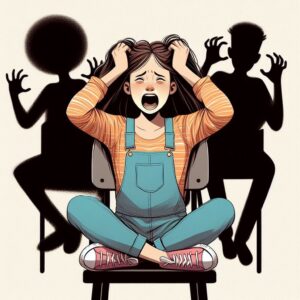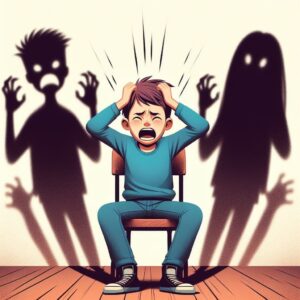What is the Mental Disorder Schizophrenia?
No healthway post selected for this post.
Schizophrenia is a severe mental disorder in which a person interprets reality in an abnormal way. Schizophrenia commonly results in the combination of delusions, hallucinations, and severely disordered thinking and behavior which disturbs daily life functioning.
People with mental disorder schizophrenia require lifelong treatment. Early treatment can help symptoms improve before serious problems develop and can help improve the prolonged outlook.

Weird Things that Schizophrenics Do
Schizophrenics do a lot of weird things. Disorganized behavior may include strange behaviors like talking to yourself, or laughing or smiling for no apparent reason. It also includes movements that seem to do for no reason, or even being annoyed or stressed without any reason. People with mental disorder schizophrenia usually have a childlike stupidity about them.
Symptoms
Schizophrenia involves a variety of problems with behavior, emotions and thinking (cognition). Signs and symptoms can differ, but commonly involve hallucinations, delusions, or disordered speech, and may reflect an disabled ability to perform. Symptoms generally include:
Early Signs and Symptoms of Schizophrenia
Schizophrenia commonly shows its early signs in men in their early 20s or late teens. It primarily affects women in their early 20s and 30s. The period when the symptoms first start and before full psychosis is known as the prodromal period. It may last days, weeks, or even years. It may be hard to spot because there is commonly no particular trigger. You might only notice behavioral changes, particularly in teens. This can includes:
-
A change in the grades
-
Social withdrawal
-
Difficulty sleeping
-
Trouble concentrating
-
Temper flares
Positive Symptoms of Mental Disorder Schizophrenia
In this situation, the word positive does not mean good. It indicates added actions or thoughts that aren’t based in reality. Positive symptoms of schizophrenia sometimes referred as psychotic symptoms and may include:
-
Delusions: These are odd, mixed, and sometimes falsebeliefs that are not based in reality and that an individual denies to give up, even when disclosed the facts. For example, a person having delusions can believe that people may hear their thoughts, that they are devil or the God, or that people are placing thoughts into their head or planning against them.
-
Hallucinations: Hallucinationsinvolve sensations that are not real. They are clear with an impression similar to the normal perceptions. Hearing voices is the most common hallucination in people having schizophrenia and related disorders.
Less common types may include seeing things that are not present there, having funny taste in mouth, smelling strange odors, and feeling some sensations on skin yet nothing is touching your body.
-
Catatonia: In this condition, a person commonly stopsspeaking, and their body can be fixed in a single position for a long period of time.
Disorganized Symptoms of Mental Disorder Schizophrenia
Disorganized symptoms are the positive symptoms that show that a person is unable to think clearly and respond as expected. Examples may include:
-
Using nonsense words, or talking in the sentences that do not make sense, making it tough for the person to hold a discussion or communicate
-
Unable to make decisions
-
Move slowly
-
Shifting from one thought to another quickly without logical or obvious connection between them
-
Writing excessive but without meaning
-
Losing or forgetting things
-
Having issues while making sense of everyday sightssounds, and feelings
-
Repeating gestures or movements, like walking or pacing in circles
Cognitive Symptoms of Mental Disorder Schizophrenia
The person may have trouble:
-
Understanding the information and using it to make decisions (a doctor may call this poor executive functioning)
-
Focusing and paying attention
-
Using information instantly after learning it (this is known working memory)
-
Recognizing that they may have any of these issues
Negative Symptoms of Schizophrenia
The word negative here doesn’t mean bad. It shows the absence of normal behaviors in the individuals having schizophrenia. Negative symptoms of mental disorder schizophrenia include:
-
Limited range of emotions or lack of emotion
-
Withdrawal from social activities, family, and friends
-
Speaking less
-
Less energy
-
Loss of interest or pleasure in life
-
Poor grooming habits
-
Poor hygiene
-
Lack of motivation

What are the 5 Causes of Schizophrenia
The accurate cause of schizophrenia is not known yet. But like diabetes and cancer, schizophrenia is an authentic illness with a biological basis. Studies have uncovered a lot of things that appear to make a person likely to get schizophrenia. Common 5 causes of schizophrenia include:
Genetics (heredity)
Schizophrenia may run in families, means a significant likelihood to get schizophrenia may be passed on from the parents to their children.
Brain chemistry and circuits
People having schizophrenia are unable to manage brain chemicals known as neurotransmitters that control specific pathways, or circuits, of nerve cells that impact behavior and thinking.
Brain abnormality
Research has declared people with schizophrenia have abnormal brain structure. But this is not applicable to all people with schizophrenia. It may affect people without this disease.
Environment
Things such as viral infections, extremely stressful situations, or exposure to toxicants like marijuana, may cause schizophrenia in people who are more likely to get this disorder because of their genes. The place where a person grows up may increase the likelihood of this disease. People living in urban areas are more in danger. It occurs mostly when the body is having hormonal or physical changes, like during teenage and young adulthood.
Drug abuse
Researchers have shown taking drugs, especially cannabis, LSD or amphetamines, and cocaine, may increase the risk of developing psychosis, schizophrenia, or a related illness.
It is unclear if drug abuse directly causes the symptoms in people who are vulnerable to schizophrenia, or if they are likely to use drugs.
If people previously had episodes of schizophrenia or psychosis, using drugs may stop the symptoms from getting better.
Research has declared that young adults and teenagers who use cannabis on a regular basis are likely to have schizophrenia in their later adulthood. The risk can be higher when cannabis is used in stronger forms.
Who Gets Schizophrenia?
Any person can get mental disorder schizophrenia. It affects people of all ages all over the world, from all cultures and races. While it may happen at any age, schizophrenia commonly first appears in the early 20s or teenage years .
This disorder affects men and women equally, even though symptoms usually appear earlier in men. The earlier the symptoms start, the more serious the illness tends to be. Children over age of 5 may have schizophrenia, but it is rare commonly before adolescence.
Diagnosis and Tests
How is Schizophrenia Diagnosed?
There is commonly no diagnostic test to assess schizophrenia. A doctor will diagnose this disease by observing how the person behaves. They will also examine their history of physical and psychological health.
The doctors may recommend some tests to find out other causes of symptoms, such as brain injury, a tumor, or other mental health conditions, such as bipolar disorder.
Diagnostic criteria
To diagnose schizophrenia, doctors will generally use the DSM-5. This manual gives criteria for diagnosing a number of mental health conditions.
According to criteria, an individual must have at least2 of the following symptoms for about a month:
-
Delusions
-
Hallucinations
-
Disorganized speech
-
Catatonic or grossly disordered behavior
-
Negative symptoms, like emotional flatness, lack of speech and motivation
At least one of the above must be 1, 2, or 3.
They must also face tremendous impairment in their ability to function at work or in school, carry-out self management tasks.
They must have symptoms that continue for 6 months or more. These symptoms must also not be due to a prescribed medication, to other health conditions, or the use of drugs.
The symptoms must also not be due to another health condition, a prescribed medication, or the use of other substances.
What tests will be done to diagnose schizophrenia?
There are not any diagnostic tests for this disorder. But doctors may perform tests to rule out other health conditions before diagnosing mental disorder schizophrenia. The most likely tests may include:
Imaging tests
Healthcare professionals will often use magnetic resonance imagining (MRI), computerized tomography (CT), and other imaging tests to find out problems like tumors, brain injuries, stroke, and other changes to the structure of your brain.
Urine, blood, and cerebrospinal fluid (spinal tap) tests
These tests are used to look for chemical changes in body fluids that can explain behavioral changes. They can find out heavy metal toxicity and other causes of infections, poisoning, and more.
Brain activity testing
An electroencephalogram (EEG) may detects and records electrical activity in brain. This test can help find out conditions such as epilepsy.
Schizophrenia Treatment
Schizophrenia treatment generally involves a combination of therapy, medication, and self-management techniques. These commonly include:
Anti psychosis: These kinds of medications block how your brain utilizes certain chemicals for cell-to-cell communication.
Other medications: Your doctor may also prescribe other medications for symptoms that may happen alongside or because of schizophrenia symptoms. They can also prescribe medications to reduce side effects of antipsychotic medications like tremors.
Some common medicines for the treatment of schizophrenia include:
-
Risperidone (Risperdal)
-
Quetiapine (Seroquel)
-
Ziprasidone (Geodon)
-
clozapine (Clozaril)
-
Olanzapine (Zyprexa)
-
clozapine (Clozaril)
-
haloperidol (Haldol)
Psychotherapy: Talk therapy methods such as cognitive behavioral therapy (CBT) may help you deal with and manage this condition. Long-term therapy may also help with secondary problems along-with schizophrenia, like depression, anxiety, or substance use issues.
Electroconvulsive therapy (ECT): If other types of treatments don’t work, your healthcare provider may recommend ECT. This treatment commonly involves using an electrical current that is applied to your scalp, the current then stimulates some parts of your brain.
The stimulation causes a concise seizure, which may help improve brain functioning if you have agitation, severe depression, and other problems. If you have electroconvulsive therapy, doctor gives you anesthesia. . You will be asleep during this procedure and won’t perceive any pain.
Daily Habits that Make a Difference
There is no proven way to prevent schizophrenia, but there are several ways to prevent or reduce its symptoms, like taking medication, receiving therapy, and avoiding substance use.
Scientists are looking for methods to make schizophrenia less likely.
-
Stay focused on treatment goals
-
Stay consistent to your treatment plan
-
Understand your warning signs
-
Take care of yourself
-
Incorporate stress management and relaxation techniques into your life
-
Join a support group
-
Educate yourself or others about schizophrenia
-
Ask about social services support
Summary
Mental disorder schizophrenia is a long-term health condition that may profoundly affect the ability of a person to function. These effects may also influence the people around them.
Treatment is available for schizophrenia that can help a person manage their symptoms. People with schizophrenia will also benefit from the support of their family, friends, and community services.
Anyone caring for someone having schizophrenia may help by learning how to spot the onset of an episode, encouraging the person to stick to their treatment plan, and helping them through their experience.
No healthway post selected for this post.
